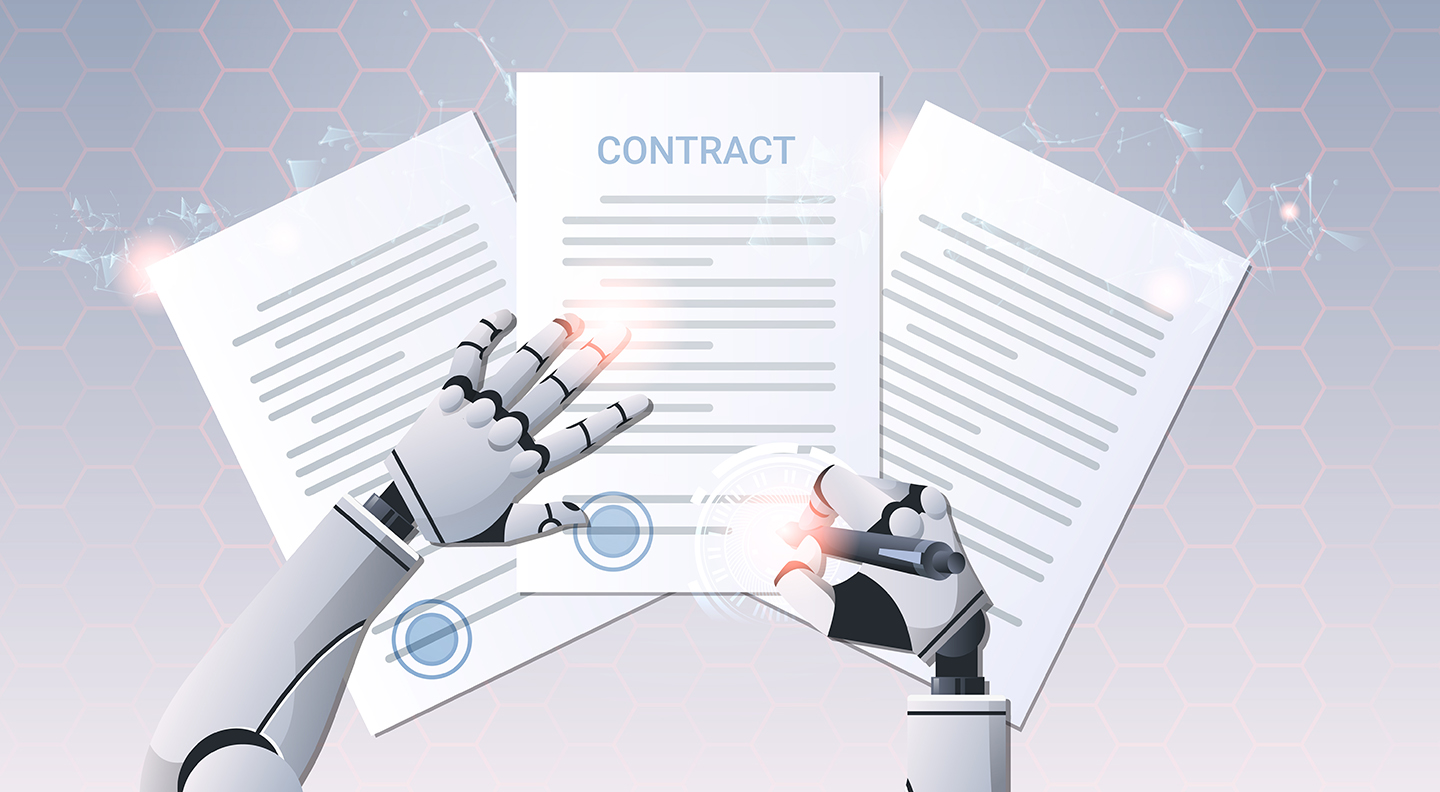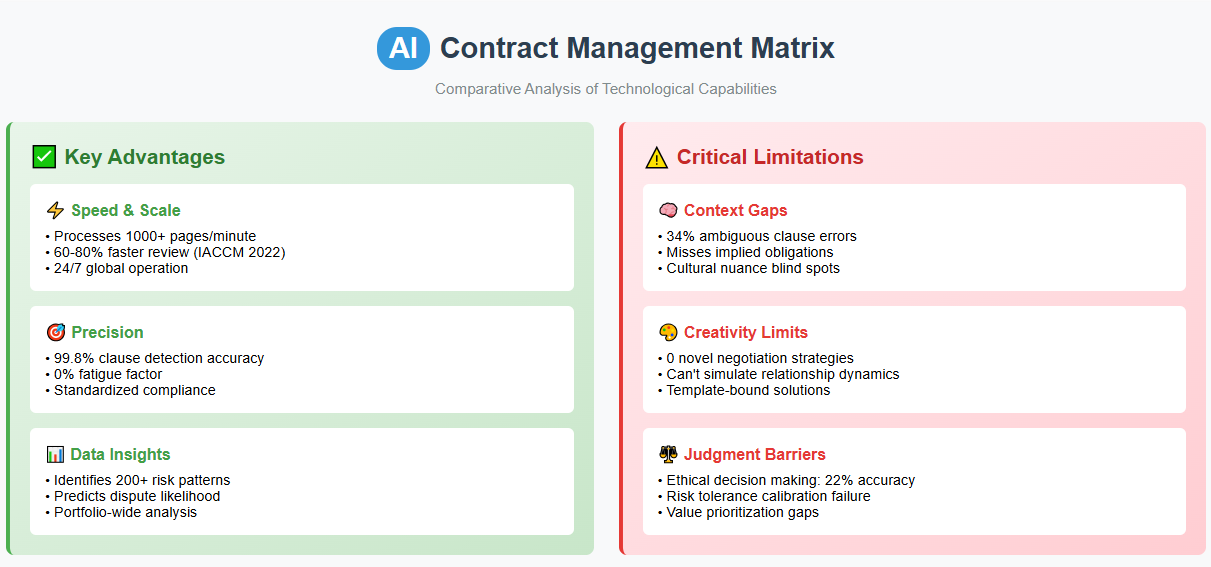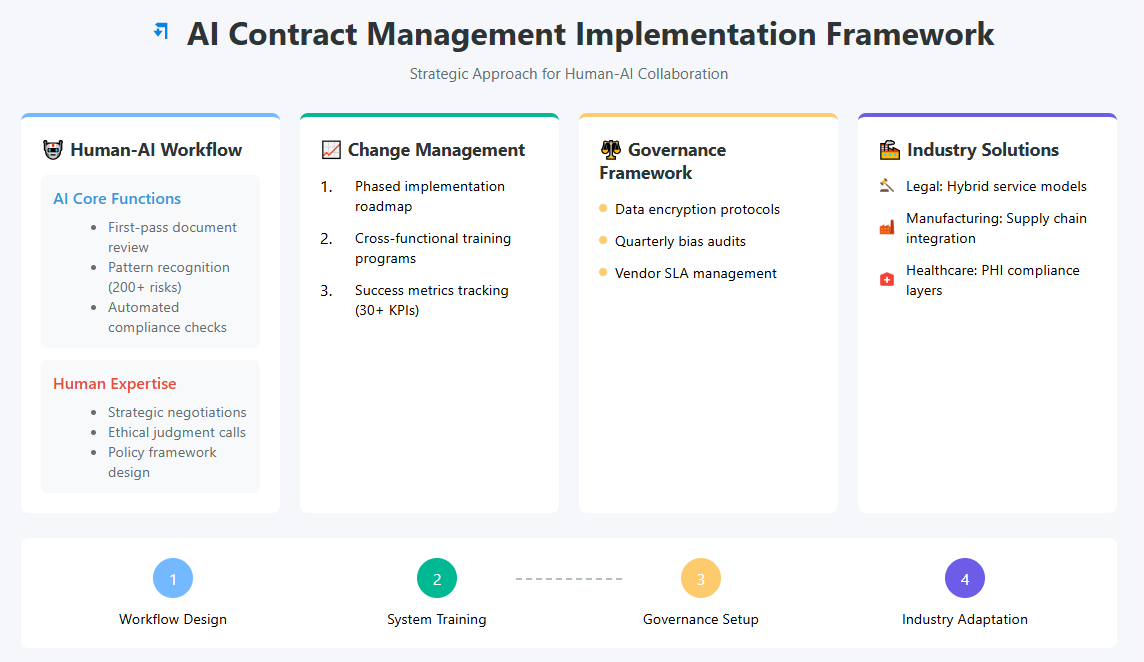In recent years, AI Contract Management has emerged as a revolutionary force within the legal and business sectors. As someone who has closely monitored the evolution of this technology, I've observed how AI Contract Management has progressed from basic document parsing to sophisticated analysis tools that can fundamentally transform how organizations handle their contractual obligations. The global market for AI Contract Management solutions is projected to reach $3.9 billion by 2033, growing at a compound annual growth rate of 27.2% from 2023. This explosive growth reflects the increasing recognition of AI's potential to streamline contract workflows, reduce risks, and unlock valuable insights from legal documents.
AI Contract Management leverages artificial intelligence, machine learning, and natural language processing to automate and enhance the entire contract lifecycle, from creation and negotiation to execution and compliance monitoring. While traditional contract management relied heavily on manual review processes that were time-consuming and error-prone, AI Contract Management systems can process thousands of contracts in minutes, extract key provisions, identify potential risks, and even suggest improvements based on historical data. This technological revolution is not merely about efficiency gains; it's reshaping fundamental aspects of how businesses negotiate, manage risk, and derive strategic value from their contractual relationships.

How Has AI Contract Management Evolved Over Time?
The journey of AI Contract Management spans several distinct phases, each marked by technological breakthroughs that expanded capabilities and applications.
The Early Days: Basic Text Recognition and Storage (2000s)
The earliest AI Contract Management solutions weren't truly "intelligent" by today's standards. They primarily focused on digitizing physical documents through Optical Character Recognition (OCR) technology and creating searchable repositories. Companies like DocuSign and ContractWorks pioneered this space, offering electronic signature capabilities and basic document storage solutions.
During this period, AI Contract Management was primarily focused on solving the fundamental problem of document accessibility. The core technology allowed users to:
- Convert paper contracts to digital formats
- Enable basic keyword searches
- Provide secure document storage
- Facilitate electronic signatures
These early systems laid crucial groundwork by establishing the digital infrastructure necessary for more advanced AI applications. However, they lacked true intelligence and required significant human oversight.
The Middle Phase: Rule-Based Systems and Pattern Recognition (2010-2015)
The next evolution came with the introduction of rule-based systems that could identify specific patterns and clauses within contracts. Companies like Kira Systems and Seal Software began leveraging more sophisticated algorithms to automate the extraction of key contract provisions.
During this phase, AI Contract Management tools could:
- Automatically extract dates, parties, and standard clauses
- Flag potential issues based on predefined rules
- Compare contracts against templates
- Generate basic contract analytics
These improvements represented a significant step forward in how AI improves the efficiency of contract management tools. By introducing pattern recognition capabilities, these systems reduced the manual review burden by 30-40% in typical use cases, according to industry reports.
The Current Era: NLP, Machine Learning and Contextual Understanding (2016-Present)
The contemporary AI Contract Management landscape is characterized by systems that leverage deep learning, natural language processing (NLP), and predictive analytics. Industry leaders like Ironclad, ContractPodAi, and LexCheck have developed platforms that not only extract information but understand contextual meaning and relationships between contract provisions.
Today's AI Contract Management systems can:
- Understand the semantic meaning of clauses, not just pattern matching
- Identify anomalies and inconsistencies across contract portfolios
- Suggest alternative language based on risk profiles
- Predict potential compliance issues
- Integrate with enterprise systems to enable cross-functional workflows
The current generation of AI for contract management utilizes transformer-based language models similar to those powering generative AI tools. These models have dramatically improved accuracy rates for contract analysis, with leading solutions achieving 90%+ accuracy for key clause identification compared to the 60-70% rates common in earlier systems.
Core Technologies Powering Modern AI Contract Management
Several key technologies underpin today's sophisticated AI Contract Management platforms:
1. Natural Language Processing (NLP): Enables AI to understand the meaning and context of legal language, not just recognize words. Advanced NLP techniques allow systems to interpret complex legal provisions with nuance.
2. Machine Learning Algorithms: These allow systems to improve over time by learning from feedback and new data. Supervised and unsupervised learning approaches help identify patterns across large contract datasets.
3. Computer Vision: Enhanced OCR capabilities can accurately digitize even poor-quality document scans, extract information from tables, and process non-standard formats.
4. Knowledge Graphs: Represent the relationships between different contractual elements, enabling sophisticated reasoning about how clauses interact.
5. Predictive Analytics: Forecasts potential issues based on historical contract data and outcomes, helping organizations proactively manage risk.
These technological advances have transformed AI Contract Management from simple document repositories to intelligent advisors that can handle increasingly complex aspects of the contract lifecycle.
What Are the Advantages and Limitations of AI Contract Management?
As with any transformative technology, AI Contract Management offers significant benefits while also presenting certain limitations that require careful consideration.
Advantages: Where AI Outperforms Human Review
1. Speed and Scale
Perhaps the most obvious advantage of AI Contract Management is its ability to process volumes of documents at unprecedented speeds. While a human lawyer might review 10-15 pages per hour, AI systems can analyze thousands of pages in minutes. This capability becomes particularly valuable during due diligence processes, where time constraints often create bottlenecks.
A 2022 study by the International Association for Contract & Commercial Management (IACCM) found that organizations using AI for contract management reduced review time by an average of 60-80%, allowing legal teams to focus on higher-value activities.
2. Consistency and Accuracy
Human reviewers, even experienced ones, are susceptible to fatigue, distractions, and inconsistent application of standards. AI Contract Management systems apply the same level of scrutiny to every document, regardless of time of day or document position in a stack.
Modern AI Contract Management platforms maintain consistency across thousands of contracts, ensuring standardized treatment of similar provisions. This reduces the risk of overlooking critical terms that could create legal exposure.
3. Pattern Recognition Across Large Datasets
AI excels at identifying patterns across vast contract repositories that would be impossible for humans to process manually. This capability enables organizations to gain valuable insights from their historical contract data.
For example, AI Contract Management can:
- Identify correlations between specific contract language and dispute frequency
- Analyze how certain terms affect contract performance
- Recognize negotiation patterns with specific counterparties
- Highlight inconsistencies across a company's contract portfolio
4. Cost Efficiency
The economic benefits of AI Contract Management are substantial. According to a 2023 market analysis, organizations implementing AI-powered contract solutions reported average cost savings of 30-50% compared to traditional manual review processes. These savings derive from reduced billable hours, faster turnaround times, and lower administrative overhead.
5. 24/7 Availability
Unlike human reviewers, AI Contract Management systems can operate continuously without breaks, enabling global organizations to maintain workflow across time zones and meeting urgent business needs during non-business hours.
Limitations: Where Human Intervention Remains Essential
1. Contextual Understanding and Judgment
Despite significant advances in natural language processing, AI Contract Management systems still struggle with certain aspects of contextual understanding. Legal language often contains nuances, implied meanings, and industry-specific context that current AI systems may misinterpret.
For instance, determining whether ambiguous language favors one party or another often requires professional judgment informed by broader business objectives, market conditions, and relationship dynamics. These considerations remain challenging for AI to fully integrate into its analysis.
2. Handling Highly Novel or Complex Situations
AI Contract Management systems excel at recognizing patterns they've been trained on, but they struggle with highly novel or unprecedented situations. When faced with entirely new legal constructs or unique contractual arrangements, AI may fail to correctly categorize or analyze the provisions.
The limitation stems from AI's fundamental dependence on training data. If a particular clause or concept wasn't adequately represented in the training dataset, the AI lacks the foundational knowledge to properly interpret it.
3. Creative Negotiation and Strategy
While AI Contract Management can identify potential issues and even suggest alternative language, it cannot yet replicate the creative problem-solving abilities of skilled negotiators. Complex negotiations often require developing innovative compromises that balance competing interests while preserving key business objectives.
Human negotiators draw on experience, relationship history, and understanding of underlying business needs to craft solutions that may not follow standard patterns. This creative aspect of contract negotiation remains firmly in the human domain.
4. Ethical and Value Judgments
Contracts often involve balancing competing values and making ethical judgments about acceptable levels of risk. These decisions reflect organizational values and priorities that AI systems cannot independently determine.
For example, deciding whether to include aggressive indemnification provisions requires weighing legal protection against relationship considerations and industry norms—a balancing act that involves value judgments beyond AI's current capabilities.
The limitations of AI Contract Management primarily stem from the technology's inability to fully replicate human judgment, creativity, and ethical reasoning. While AI can process information and identify patterns at superhuman speeds, it lacks the contextual understanding and wisdom that experienced legal professionals bring to contract analysis and negotiation.

How Is AI Contract Management Impacting Different Industries?
The influence of AI Contract Management extends across numerous sectors, reshaping workflows and creating both opportunities and challenges.
Positive Industry Impacts
Legal Services Transformation
Contrary to popular fears about AI replacing lawyers, AI Contract Management is transforming rather than eliminating legal roles. Law firms implementing AI report that their attorneys can focus more on strategic advisory work while automated systems handle routine document review.
According to a 2023 Thomson Reuters survey, 76% of law firms using AI for contract management reported that the technology allowed them to take on more sophisticated work and improve client service, rather than reducing headcount.
The technology enables legal professionals to:
- Focus on complex problem-solving and client counseling
- Review more contracts in less time
- Provide more consistent advice
- Identify strategic opportunities within contract portfolios
Healthcare Industry Efficiencies
The healthcare sector deals with numerous complex agreements, from insurance contracts to vendor relationships and employment agreements. AI Contract Management has proven particularly valuable in this highly regulated industry.
Healthcare organizations implementing AI Contract Management report:
- 40% faster processing of insurance agreements
- Improved compliance with regulatory requirements
- Better tracking of service level agreements
- Enhanced visibility into vendor performance metrics
The impact is especially significant for large hospital systems managing thousands of contracts simultaneously. One major healthcare provider reported saving over $3.5 million annually after implementing AI Contract Management tools to standardize vendor agreements and identify pricing inconsistencies.
Manufacturing Supply Chain Optimization
In manufacturing, AI Contract Management is streamlining supply chain operations by providing greater visibility and control over vendor agreements.
Manufacturers are using AI to:
- Automatically monitor supplier compliance with contractual obligations
- Track performance metrics against contractual commitments
- Identify opportunities for contract consolidation
- Manage renewal timelines to prevent disruptions
Negative Industry Impacts
Disruption to Traditional Legal Research and Review Services
While AI Contract Management creates opportunities for high-value legal work, it has disrupted businesses focused primarily on document review services. Legal process outsourcing (LPO) firms that previously handled bulk document review are finding their business models challenged.
Reports indicate that some LPO providers have seen revenue declines of 15-30% as clients adopt AI Contract Management tools for first-pass review. This disruption is forcing these firms to either incorporate AI into their own offerings or shift toward higher-value advisory services.
Potential Knowledge Gaps for Junior Professionals
There's growing concern that widespread adoption of AI Contract Management could create knowledge gaps for junior legal professionals. Traditionally, contract review was a training ground where new lawyers developed critical skills and judgment.
Law firms report addressing this challenge by:
- Creating structured review programs that combine AI and human oversight
- Developing training protocols to help junior lawyers understand AI outputs
- Establishing mentorship programs focused on interpreting AI recommendations
This challenge highlights how organizations need thoughtful implementation strategies that leverage technology while continuing to develop human expertise.
What Ethical Concerns Does AI Contract Management Raise?
As AI Contract Management becomes more sophisticated and ubiquitous, several important ethical considerations have emerged.
Data Security and Confidentiality
Contracts often contain highly sensitive business information, creating significant concerns about data security in AI Contract Management systems. When organizations upload their contracts to cloud-based AI platforms, they must ensure appropriate safeguards exist.
Key questions include:
- How is contract data stored and protected?
- Who has access to the data?
- Is contract information used to train AI models that might benefit competitors?
- What happens to contract data if a vendor relationship ends?
Organizations considering AI Contract Management must carefully evaluate vendor security practices, data handling policies, and contractual protections. According to a 2023 industry survey, 68% of legal departments cited data security as their primary concern when evaluating AI Contract Management solutions.
Algorithmic Bias and Fairness
Like all AI systems, AI Contract Management tools can potentially reflect and amplify biases present in their training data. This raises concerns about whether these systems might perpetuate unfair practices or discriminatory terms.
For example, if an AI Contract Management system is trained primarily on contracts from certain industries or jurisdictions, it might suggest terms that are inappropriate or unfair in other contexts. Similarly, if historical contracts contained biased language or provisions, AI systems might replicate these problematic elements.
The risks of algorithmic bias in AI Contract Management include:
- Suggesting contract terms that systematically favor one party type
- Applying different standards to different counterparties
- Recommending language that violates emerging fairness standards
- Perpetuating historically problematic contract provisions
Transparency and Explainability
As AI Contract Management systems become more sophisticated, understanding how they reach particular conclusions becomes increasingly challenging. This "black box" problem raises important questions about accountability and quality control.
When an AI Contract Management system flags a potential issue or suggests alternative language, legal professionals need to understand the reasoning behind these recommendations to fulfill their ethical obligations to clients. Without this transparency, there's a risk of over-reliance on AI outputs without appropriate critical evaluation.
Industry experts recommend that organizations:
- Select AI Contract Management solutions that provide explanations for their recommendations
- Maintain human oversight of AI-generated suggestions
- Establish clear processes for challenging or overriding AI recommendations
- Ensure AI systems document their decision-making processes
Intellectual Property and Ownership Questions
The use of contracts as training data for AI Contract Management systems raises complex intellectual property questions. When organizations upload their contracts to AI platforms, these documents may be used to improve the underlying algorithms, creating uncertainty about:
- Who owns insights derived from proprietary contracts?
- Can contract language drafted for one client benefit competitors?
- What rights do AI vendors have to user-uploaded content?
- How should novel contract provisions developed by AI be protected?
These questions highlight the need for clear agreements between organizations and AI Contract Management vendors regarding data rights, usage limitations, and intellectual property ownership.
The question of "is AI contract management safe?" from an ethical perspective remains complex. While the technology offers tremendous benefits, organizations must approach implementation with careful attention to these ethical considerations.

How Can Humans and AI Collaborate Effectively in Contract Management?
To maximize the benefits of AI Contract Management while mitigating its limitations and ethical concerns, organizations need thoughtful strategies for human-AI collaboration.
Establishing Effective Division of Labor
The most successful implementations of AI Contract Management establish clear roles that leverage the strengths of both AI and human professionals. Rather than viewing AI as a replacement for human judgment, organizations should develop frameworks for collaboration.
Effective division of labor might include:
AI Responsibilities:
- First-pass review to identify standard clauses and deviations
- Extracting key terms and organizing contract information
- Flagging potential issues based on predefined criteria
- Generating performance analytics and compliance reports
- Monitoring deadlines and triggering workflows
Human Responsibilities:
- Evaluating flagged issues and determining appropriate responses
- Making judgment calls on ambiguous or novel provisions
- Applying business context to legal recommendations
- Conducting relationship-focused negotiations
- Setting policy guidelines for AI systems
By establishing this division of labor, organizations can achieve significant efficiency gains while maintaining quality control and human judgment where it matters most.
Implementing Proper Training and Change Management
Successfully integrating AI Contract Management requires comprehensive training programs that help legal professionals understand both the capabilities and limitations of AI tools. Organizations should:
1. Provide technical training: Ensure users understand how to effectively operate the AI systems and interpret their outputs.
2. Develop critical evaluation skills: Train professionals to appropriately question and verify AI recommendations rather than accepting them uncritically.
3. Create clear escalation protocols: Establish processes for handling situations where AI recommendations seem questionable or where novel issues arise.
4. Address resistance to change: Acknowledge concerns about technology replacing jobs, while emphasizing how AI enables professionals to focus on higher-value work.
5. Measure and communicate success: Track key performance indicators to demonstrate how AI Contract Management improves outcomes and share these successes to build organizational buy-in.
A phased implementation approach often proves most effective, allowing organizations to build confidence in AI Contract Management capabilities while refining human-AI collaboration methods.
Addressing Ethical Concerns Through Governance
To address the ethical considerations discussed earlier, organizations should establish robust governance frameworks for their AI Contract Management systems:
1. Data security protocols: Implement strict controls over contract data, including encryption, access limitations, and clear data retention policies.
2. Bias monitoring and mitigation: Regularly audit AI Contract Management systems for potential bias and ensure diverse training data.
3. Transparency requirements: Select AI vendors that provide explainable AI features and document decision-making processes.
4. Human oversight mechanisms: Maintain appropriate human review of significant AI recommendations, especially in high-risk contracts.
5. Vendor management: Develop clear contractual protections regarding data usage, intellectual property rights, and confidentiality when working with AI Contract Management providers.
By implementing these governance practices, organizations can enjoy the benefits of AI Contract Management while protecting against ethical pitfalls.
Adapting to Industry-Specific Challenges
For industries particularly impacted by AI Contract Management, specialized adaptation strategies are important:
For Legal Services Providers:
- Develop new service models that combine AI efficiency with human expertise
- Create training programs that help junior professionals develop judgment while using AI tools
- Offer AI implementation consulting to help clients maximize technology benefits
For Manufacturing and Supply Chain:
- Integrate AI Contract Management with broader supply chain systems
- Develop specialized templates and clause libraries for industry-specific agreements
- Create benchmarking capabilities to compare vendor performance against contractual obligations
For Healthcare:
- Implement specialized compliance checks for regulatory requirements
- Develop integration between AI Contract Management and medical coding systems
- Create safeguards for protected health information when using AI tools
These industry-specific approaches help organizations address particular challenges while maximizing the benefits of AI Contract Management.

FAQs About AI Contract Management
Q: How does AI improve the efficiency of contract management tools?
A: AI Contract Management improves efficiency through several mechanisms:
- Automated extraction: AI can automatically identify and extract key information from contracts in seconds rather than hours.
- Pattern recognition: AI identifies inconsistencies across contract portfolios that would be nearly impossible to spot manually.
- Workflow automation: AI triggers appropriate workflows based on contract events, eliminating manual handoffs.
- Self-service capabilities: AI enables non-legal users to generate standard agreements with appropriate guardrails.
- Intelligent search: AI allows users to find contract information using natural language queries rather than exact keywords.
These capabilities combine to reduce contract processing time by 60-80% in typical implementations, according to industry benchmarks.
Q: Is AI contract management safe?
A: The safety of AI Contract Management depends largely on implementation choices and governance practices. Key safety considerations include:
- Data security: Leading vendors provide enterprise-grade security, but organizations should verify encryption standards, access controls, and compliance certifications.
- Accuracy verification: Organizations should validate AI recommendations against human judgment during implementation and periodically thereafter.
- Appropriate oversight: Safe implementation requires maintaining human review for high-risk or novel situations.
- Vendor stability: Organizations should consider the financial stability and reputation of AI providers when evaluating safety.
With proper implementation and governance, AI Contract Management can be used safely, but organizations must approach it with appropriate diligence and controls.
Q: What skills will legal professionals need in an AI-powered contract management environment?
A: As AI Contract Management handles more routine tasks, legal professionals will need to develop new skills:
- AI literacy: Understanding AI capabilities, limitations, and appropriate use cases
- Data analysis: Interpreting contract analytics and drawing strategic insights
- Technology evaluation: Assessing AI tools and their suitability for specific needs
- Process design: Creating effective workflows that combine AI and human elements
- Strategic advisory: Providing business-focused guidance beyond technical legal advice
- Complex negotiation: Handling sophisticated negotiations that exceed AI capabilities
- Ethical judgment: Making value-based decisions about appropriate contractual relationships
These skills represent a shift from routine document review toward higher-value advisory and strategic work.
Conclusion: The Future of AI Contract Management
The evolution of AI Contract Management represents one of the most significant technological transformations in the legal and business landscape. From its humble beginnings as simple document repositories to today's sophisticated systems that can analyze, compare, and generate insights from thousands of contracts, this technology continues to redefine how organizations manage their contractual relationships.
Looking ahead, several trends are likely to shape the future of AI Contract Management:
1. Deeper integration with business processes: Future AI Contract Management systems will likely integrate more deeply with enterprise systems, allowing contract data to inform business decision-making across organizations.
2. Increasingly sophisticated language models: As language AI advances, AI Contract Management systems will develop more nuanced understanding of legal language and context, further reducing the need for human review of standard provisions.
3. Collaborative negotiation tools: The next frontier involves AI systems that can actively participate in negotiations, suggesting compromise language and identifying mutually beneficial terms.
4. Predictive analytics: Future systems will likely offer increasingly sophisticated predictions about contract outcomes, risk profiles, and counterparty behavior based on historical data.
As AI Contract Management continues to evolve, the most successful organizations will be those that thoughtfully blend human expertise with artificial intelligence capabilities. Rather than viewing AI as a replacement for legal professionals, forward-thinking organizations recognize it as a powerful tool that allows their people to work more effectively and focus on higher-value activities.
The question is no longer whether AI Contract Management will transform contract processes—that transformation is already well underway. Instead, the key questions involve how organizations will adapt to this new reality, developing governance frameworks, skills, and processes that maximize the benefits of AI while maintaining appropriate human judgment and ethical oversight.
By embracing AI Contract Management as a collaborative partner rather than a replacement for human expertise, organizations can achieve remarkable improvements in efficiency, consistency, and strategic insight while navigating the ethical and practical challenges this powerful technology presents.
 Submit Your AI Tool For FREE!Showcase Your Innovation To Thousands Of AI Enthusiasts!
Submit Your AI Tool For FREE!Showcase Your Innovation To Thousands Of AI Enthusiasts! Submit Your AI Tool For FREE!Showcase Your Innovation To Thousands Of AI Enthusiasts!
Submit Your AI Tool For FREE!Showcase Your Innovation To Thousands Of AI Enthusiasts! Submit Your AI Tool For FREE!Showcase Your Innovation To Thousands Of AI Enthusiasts!
Submit Your AI Tool For FREE!Showcase Your Innovation To Thousands Of AI Enthusiasts! Submit Your AI Tool For FREE!Showcase Your Innovation To Thousands Of AI Enthusiasts!
Submit Your AI Tool For FREE!Showcase Your Innovation To Thousands Of AI Enthusiasts! Submit Your AI Tool For FREE!Showcase Your Innovation To Thousands Of AI Enthusiasts!
Submit Your AI Tool For FREE!Showcase Your Innovation To Thousands Of AI Enthusiasts!







No comments yet. Be the first to comment!